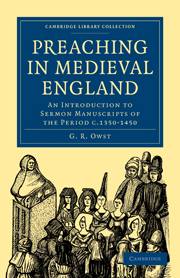CHAP. IV - “INTER MISSARUM SOLLEMNIA”
Published online by Cambridge University Press: 07 September 2010
Summary
Hit was uppon an holy-day, in an heiʒ feste of the ʒere, Muche folk was to churche gon, godes word for to here; The preeste of the chirche undude the gospel, And lerede the parischens, as he couthe wel.
Every preacher, if he be worthy of the name, will have an audience of some kind. Nor indeed will that audience be the only thing that casts an influence, for better or for worse, upon his endeavour. Unless he be a man of unusual obtuseness, he will respond somewhat to his material environment also; he will at least be limited by times and seasons and regulations of worship. Thus the natural curiosity arises, as we proceed, to see something of these “parischens” and others who hang around him, something, too, if we can, of the place where he stands,—all, in fact, that may contribute to what past experience of the gay company of the middle ages would lead us to imagine as a picturesque if not actually another gay scene in itself. On this matter the reader shall now be allowed to make judgement.
The question must first be asked, what of the place of preaching in the religious services of the day? More than one ecclesiologist has remarked on the extreme paucity of references to the sermon in the great ritual books. It has suffered precisely that fate of being overwhelmed by the grander spectacles of “ordynall” and “uss,” which Wycliffe himself deplores. Yet with regard to regular Sunday and feast-day, two formal occasions of preaching can be discerned. The first is that occurring “inter missarum sollemnia,” as the Registers say.
- Type
- Chapter
- Information
- Preaching in Medieval EnglandAn Introduction to Sermon Manuscripts of the Period c.1350–1450, pp. 144 - 194Publisher: Cambridge University PressPrint publication year: 2010First published in: 1926



